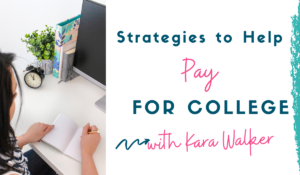
Deciding what colleges to apply to can seem like a monumental task! There are a lot of factors to consider including the cost of attendance, your current financial situation, grades, GPA, test scores, potential major, location, size of the school, how it feels, and more!
Today we are going through multiple areas you need to consider when deciding what colleges you should apply to.
This show is for the confused college applicant and family to learn simple and effective strategies to help you find the BEST college for your student while having positive conversations. This will turn you into the College Ready applicant and family so you can be confident with your next steps and your choice of college!
Please subscribe so you don’t miss any episodes! Here are a few episodes you might be interested in:
- Episode 4 You Don’t Have to Attend an Elite College to be Successful
- Episode 13 How to Track Your College Application Deadlines
- Episode 25 College App for Students: You Don’t Have to Wait Until the Fall to Start
- Episode 30 Tell Your Story in the College Application
You can also download our free guide on How to Start or Expand Your College Search here.
I’m Courtney Kountz and I’m looking forward to serving you and your student!

Podcast Transcript
Speaker 1 (00:03):
Deciding what colleges you are going to apply to is such a huge decision in the college admissions process. So today what I want to do is a really deep dive into the factors that you want to consider as you are looking at what schools, how many, looking at just a lot of those different factors. So cost of attendance, your current financial situation, grades, GPA, test scores, major, potential major, knowing that sometimes it’s going to end up changing the location of the school size, how you feel about it and so much more. We’re going to dig into all of those factors to really be able to help make sure that you are in a good place with knowing what colleges should you apply to. So for those of you that don’t know me, my name is Courtney. I’m the founder of Confused to College Ready and I am super excited to be able to get to know you.
Speaker 1 (01:02):
I am a school counselor, I was a mental health therapist, turn school counselor. I have over 16 years experience and I love being able to help students figure out what the right path is for them. If you have not done so already, please subscribe to our show and leave a comment, leave a review about how this has helped you and please share it with others. In addition to that, on July 25th, we are going to be starting our brand new beta launch group for our course that we’re going to be launching and our group coaching program. And so I also would love for you to be able to come see just what our coaching looks like and what our courses are going to look like. This isn’t completely free. The only thing I ask is for feedback about what would be beneficial and a testimonial for what you’re doing, but you can find more information on that at confused to college ready.com/c two cr beta BETA app APP.
Speaker 1 (02:13):
And I really hope that we see you in the group. We’ve already got people in there, some great conversations started and I hope that we see you. Okay, so let’s dive into this training. I’ve worked with a lot of students. I’ve worked with actually hundreds of students at this point, and a large part of what we talk about during their high school experience is what colleges are they looking at and how they know where they should apply. The closer that you get to senior year, the quicker that you’re going to be looking at making those decisions. But today, like I said, I really want to dive in and look at what that application looks like to be able to help especially our seniors as you are looking into your application process. So there are several different pieces that we want to look to review and be aware of as you’re making your decisions about what colleges might be a good fit.
Speaker 1 (03:12):
So one of the things is you’re going to have your general application to the college and in several of our episodes we’ve talked about what those applications can be, whether that be the common application, whether that be the coalition application, the HBCU, has the HBCUs have their own specific application or if that be direct to the college. So you want to look at the application for the school itself, but you also want to see does your preferred major have a specific application, an additional application that you need to do above and beyond the general college application. So some colleges have, for example, in the healthcare field, some business schools, some engineering schools, and then other majors are going to have a separate application that you’re going to need to fill out or they might be looking at you in within that college that you’re saying, okay, this is the major that I’m interested in.
Speaker 1 (04:15):
And the colleges are going to say, okay, we’re going to take this many students in, let’s just say the nursing program and that maybe you’re going to be accepted into a college, into the university for an undeclared major or another major and then you could apply into that particular program. So that’s something to be aware of as you are taking on some of those different, looking at the different applications, looking at your admissions offers as they come in. Were you accepted into the university and if so, were you accepted into the major that you’re interested in? If not, you want to be aware of what you are accepted into because sometimes getting into those colleges and those majors afterwards can be very difficult. So that’s just something to keep in mind as you are looking at potential majors. Where can you find information about these colleges?
Speaker 1 (05:13):
How do you know what’s needed on the application? How do you know what you should be doing? How do you know where to focus your time? These are all good questions. So I want to, we’re going to go over four different ways and I’m going to actually give you a bonus fifth one as I’m thinking about it, but we’re going to go over four different ways for you to learn more about the school. Actually, I’m going to give you a sixth bonus one. So one of them is that school website you are. I really would encourage you to look at the school website to look at the information that’s on the prospective page to dig into information about your major. There are different ratings and rankings. I will tell you be careful with those. Many times the colleges are the ones who are giving those specific majors or they’re the ones that are giving information about those rankings.
Speaker 1 (06:15):
So I have an entire podcast episode that is devoted to not just looking at elite colleges and why you don’t have to attend an elite college to be successful. So please go back and listen to that if you haven’t already. It does not have to be an elite college. So ratings are one way. That college website is your second the common data set. This is a really great way to learn about the college and to learn about all of the different things that they have ready for you. As we look at the common data set, you’re going to find information about GPA. You’re going to find information about class rank of the previous incoming class. You’re going to find information on how many people had to take out student loans, the percentage of people, what the average debt was for students as they left the particular school.
Speaker 1 (07:13):
You’re going to be able to find out information about all kinds of factors about that school so that you can see what is it that is going to make to help you make your decision about whether this school might be a good fit for you. One other thing to check with that demonstrated interest or with that particular common data set is demonstrated interest. So demonstrated interest is the college is looking at how much interest have you shown in looking at their school? Have you opened the emails that were sent? Have you been on their website? How long did you stay? Was this just a quick that you went in and looked at it really quickly and left? Are you engaging with things? Are you responding to emails? Are you attending campus visits or virtual visits? If it’s something where it’s not close or it’s not an option for you to get there, all of those things can make a difference for demonstrated interest, but not all colleges are looking at that.
Speaker 1 (08:16):
So as you look at the common dataset, check to see if those schools, if that demonstrated interest matters. Another thing is having contact with those college admissions officers. Even if the demonstrated interest doesn’t count, the admissions officers can be your best route to be able to learn if that particular school is going to be a good fit or answering questions. So sometimes students will come to me and say, does it matter if I take this math class or this math class as a senior? Does it matter if I take statistics or calculus? Well, maybe, but maybe not. Sometimes it depends on your intended major. Sometimes it depends on the school. And so being able to have a conversation with an admissions officer to hear about what it is that they’re looking for can absolutely be helpful to help. As you look at what courses do you want to take, how do you want to finish navigating out the rest of your high school career?
Speaker 1 (09:16):
So we’ve got the college website, we have the admissions officers, we have the common data set, your net price calculator. So this is a great tool as far as finances. You can enter in your information on the net price calculator. So you’re going to enter in some of your family’s financial information. You’re going to enter some information about where you have been as far as your GPA and rank. They’re going to look at previous years graduating or previous year’s entry class or the class that you would be equivalent to and what would be your expected merit aid loans, grants, scholarships, other financial aid information. This can change a little bit. Some colleges are going to end up having a, they’re going to end up having a tuition increase over the summer. So it doesn’t mean that these numbers are set in stone, but it can give you some ideas on what you might expect.
Speaker 1 (10:18):
So that should be helpful as well. We talked about the college website. College board has their big future where you can do career interest inventories, you can look into potential colleges, enter in what are some of those things that you absolutely have to have, and we’ll talk more about that in a minute. What are the things that you have to have? Are there any things that would be a deal breaker? As you’re looking at all of those pieces, we want to make sure that you are in a good place with knowing what schools are going to be a good fit for you. And when we look at those schools, so those are the places where you can find that information about your colleges. We want to make sure that you have a well-rounded list. So it’s not just elite colleges and it’s not just your safety schools.
Speaker 1 (11:11):
You want to have a well-rounded list and we want to look at what’s going to be the best fit for you. So the first conversation that I want you all to have as a family is really going to be the money conversation. So looking at that net price calculator, looking at what you as a family are going to be able to afford in helping your child or children and saying, you know what? You can expect this much money from us and after that it will have to be scholarships or other sources of financial aid, whether that be loans or whatever grants, Pell grant work study or other areas, or is this something where you’re going to have money is not going to be an issue and that it’s going to be completely taken care of and your student doesn’t need to look at that. Looking at that net price calculator, knowing how much colleges are normally giving, do they meet need or is it something where they have a certain amount of money and that’s what you get.
Speaker 1 (12:26):
So having that money conversation first is incredibly important. Then we want to look at your safety, your reach, and your match schools. So a safety school is where I would say 75 to 80% of students are going to be accepted. As you’re looking at GPA, you’re looking at class rank. The majority of these schools are going to accept students that have similar statistics to you. A match school is going to be anywhere between probably the, you are meeting at least 40 to 50% of maybe a little bit lower up to that, 75 to 80% as you’re getting into the safety school. But that your criteria, your scores are meeting those averages. And then a reach school is one where we’re like 25 to 30%, sometimes way lower than that of the students that with your particular scores are accepted. So you want to be sure that you’re not only putting reach schools on your list if you only are applying to colleges that are not necessarily going to be likely to accept you.
Speaker 1 (13:40):
The last thing I want to see is that you get into March or April of your senior year and you’ve gotten a no from every school. One that’s going to be really hard on your mental health two and you can end up feeling just dejected when you have multiple no’s and you don’t have schools that you’re truly comfortable with. We want to make sure that you feel good about where you’re going to be going, but we also don’t want you to have only safety schools unless all of those safety schools are ones that you are really okay and would feel good about attending. I’ve seen students in both boats where they only apply to the reach and then they feel disappointed afterwards. I’ve seen students who have only applied to safeties and then later on when they get their acceptances they think, man, I should have really tried for some more challenging schools.
Speaker 1 (14:33):
So those are the things that I want you to consider as far as where you fall into the information on that common data set about the last incoming class. So we’ve got safety, reach and match. For me, the thing that’s most important because it does not have to be an elite school, you can still get a fabulous education and still be successful when you are attending a school that is not necessarily an elite one. So we’re going to talk about money. We want to look at how you match up with who they have been accepting, and then I really want you to think about different factors in the school that you’re looking for. Are you most interested in athletics? Does your student need to be able to make it to all the games and be able to be there and be supportive? Do they need to be close to shopping?
Speaker 1 (15:28):
And so being out in the country or far away from things that would be a problem or where they wouldn’t be able to spend as much of their time, what are the specific factors? Do they have to be part of a certain group? Is there how inclusive is the school? Is that something that’s a factor that’s important? So just looking at all of those things. So what are the things that I absolutely have to have in a school and are there any things that might be a deal breaker for me? So this is not something I want anything to do with if a college has it, then I’m going to cross it off of my list. That’s just as important to know as what is it that you want to have or does this feel like a good fit? We don’t want your students to end up getting onto campus and deciding that they absolutely hate where they’re going and what they’re doing because these factors weren’t considered ahead of time.
Speaker 1 (16:24):
When you come into our group coaching program, we’re actually going to break that down into a lot more detail for these first couple of weeks. And then as the program launches, the paid version of that program launches, then we will continue to have those conversations within the group. So again, don’t forget, if you are interested in joining us, the website is confused to college ready.com/c2 cr beta BETA app APP. Or you can just look in Facebook for the confused to College ready beta group, beta launch group and you can join fill in your information. We are accepting applications and I would love to see you in there. So we want to look at, like I said, we want to look at all of those different pieces. So we’re having the money conversation, we’re talking about the fit of the school, we’re talking about the must haves and the can’t stands, the deal breakers.
Speaker 1 (17:22):
And then I also want you to think about the location. If you don’t like the cold, you do not want to be looking up north in Michigan or Wisconsin or the Dakotas or anything like that. You want to make sure that location wise, it’s going to be a good fit. If you are looking into marine biology, Nevada’s probably not going to be the best place or somewhere out in the Midwest where you are not near an ocean, probably not the best option for you. You want to make sure that the schools have the majors that you are interested in and then the size, if being in a class with a ton of people is going to be overwhelming, you want to look at the common class size to see where that fit might be. And then I also want to just encourage you to, I really just want to encourage you to consider can you see yourself on that campus?
Speaker 1 (18:13):
What does your gut feeling? Say you’re going to be there for four years and I have seen all too often that someone thinks it’s going to be a great fit and they get on campus and that first year they feel like it is just miserable and they transfer. Transferring is okay as well, but if it’s something where you go visit the campus, if you’re able to and you can say, yep, I can absolutely see myself here, or you can’t see yourself on campus and you go, oh my gosh, I don’t want anything to do with this. This is not going to be good. That gut feeling, I’m really big on that one too. So making sure that it’s comfortable and that you are going to be okay with being on that campus. And that ties into the last point that I want to talk about, which is I want you to apply to the schools that you’re really going to be comfortable with, schools that you’re truly interested in, schools that you would be okay with being accepted to so that if you do get a no from a college or a university, that it doesn’t feel like it’s the end of the world, that the colleges that are on that list feel good and that if you got a no from one and you got a yes from another, that you’re going to be comfortable and confident with where you’re going.
Speaker 1 (19:29):
You don’t need to apply to 50 colleges, you don’t need to apply to 30 colleges. You don’t need to apply to 25 colleges. And the colleges can also tell that when you’re just filling out an application to have another one in there, they can tell based on some of your responses and things. I hope this has been helpful. I know that it’s a lot of information about the colleges that you should apply to. If you are interested in having a conversation with me and being able to go into this in more detail, please join the group for our free four-week training on getting started with the college search and identifying what schools you want to apply to. And also, please don’t hesitate to share this with others. I welcome as many people as are interested in joining and I look forward to talking with you next time. Thanks and take care.








